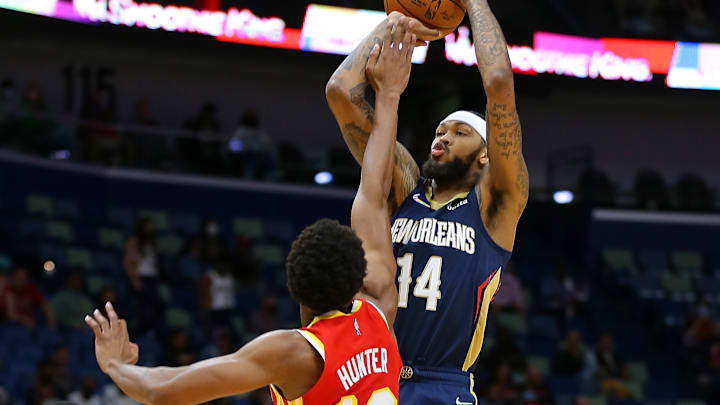The Cleveland Cavaliers almost didn't trade for De'Andre Hunter.
In the moment on Trade Deadline day, the deal seemed fairly straightforward. Whispers began the day before that the Cavaliers were talking to the Atlanta Hawks about a deal centered around the former No. 4 pick.
The morning of the Trade Deadline, February 6th, the reporting began to sharpen. The two sides seemed to be locked into negotiations with one another, the return package from Cleveland began to take shape, and it was expected hours before the deal was officially reported that it would get done.
While it may have appeared to be that clearcut from the outside, new reporting now reveals that the Hawks were fielding multiple other suitors for Hunter, and Cleveland had to win a negotiating battle to get the deal done.
Who did the Cavaliers need to outbid? It turns out that they were caught in a four-team trade maelstrom that ended up falling neatly into two independent trades -- but that it nearly resulted in Cleveland being left out in the cold.
As reported by Jake Fischer of The Stein Line, the Toronto Raptors and New Orleans Pelicans were both in trade discussions with Atlanta that would have landed Hunter with either team, and that the Cavaliers "viewed the Raptors as their foremost threat to landing Hunter."
The Cavaliers had to outbid Toronto and New Orleans
What essentially blossomed one the eve of the deadline and then came to a head on Trade Deadline day itself was a web of negotiating centered on two players: Brandon Ingram and De'Andre Hunter.
The Toronto Raptors wanted to upgrade their forward line, with an offensively-minded player to pair with Scottie Barnes as their long-term 3. Given their long history coveting length it was no surprise that they would like Brandon Ingram, but Fischer reported that the Raptors have been interested in Hunter for years and discussed potential trades with Atlanta going back to the 2023 NBA Draft.
While the Raptors negotiated potential deals for both Brandon Ingram and De'Andre Hunter, weighing the cost for both in terms of trade outlay and contract, the Atlanta Hawks were doing some decision-making of their own. They were open to moving Hunter, but needed to decide: did they want to "sell him" in a deal to a contender like the Cleveland Cavaliers, or did they want to instead package him to upgrade at the forward position with a player like Brandon Ingram.
The Hawks toyed with a few such upgrade options -- they also spoke with the Phoenix Suns about taking on Bradley Beal -- and it seems they got deep into negotiations with the New Orleans Pelicans on a trade for Brandon Ingram, with Ingram going to Atlanta and Hunter and Clint Capela landing with the Pelicans.
It was a very real possibility that Hunter could have gone to either Toronto or New Orleans, and the Cavaliers would have needed to quickly pivot to "Plan B" -- whether that would have been Cam Johnson or Marcus Smart, or merely making a much smaller move at the deadline.
Something clicked on deadline day to separate the two deals. Perhaps it was Atlanta's reluctance to sign Ingram to an extension that chilled that potential future -- whether Ingram's camp exerted influence or the Hawks' package just wasn't as good because of it. Perhaps the Cavaliers added an extra first-round swap to get it done.
In the end, the Raptors chose Brandon Ingram, trading for him and quickly agreeing to a three-year, $120 million extension. The Hawks and Cavaliers were then able to carry things over the finish line, and De'Andre Hunter is now on the Cleveland Cavaliers.
The "What Ifs" of NBA history are always worth a look, and now we know a little bit more about the road not traveled for the Cavaliers this year.
